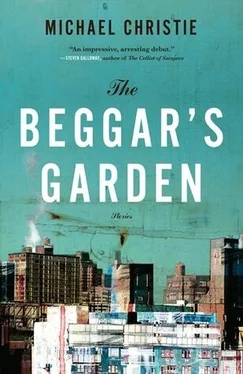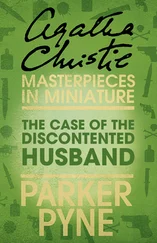“Manitoba,” she read, feeling how the word made her mouth go as hollow as a birdhouse, then set the spoon aside. Later, she dropped it into the pocket of her camel pea coat before turning off the lights, locking up and walking for the bus.
Her apartment was half dwelling, half museum. She’d assembled her collection over the years, piece by piece, each object assigned its own special place within the whole. Something rested on every available surface — wide-eyed dolls, ceramic candy dishes, commemorative platters, a wooden Indian, plants both real and fake, three Bakelite radios, a stuffed squirrel, bottles and containers from products long discontinued. There were exactly ten decorative lamps in her bedroom alone, and every square inch of the apartment’s floor not obscured by furniture was layered with a thick icing of ornamental rugs. On her walls, paintings and hangings shouldered for space — velvet landscapes, nets of macramé, portraits of winsome children. This collection was not random; there were some themes: near the living room window lived a sanctuary of owl-related items — owl ashtrays, tiny china owl figurines, a hooting clock — and in the bathroom a nautical motif — a tugboat soap dish, anchor-embroidered towels, a miniature ship’s wheel for the toilet flusher.
It wasn’t that these things were valuable. Most were just plain strange — tacky memorabilia and dead concepts of beauty to which Bernice had taken an unexplainable liking. Perhaps it was their very oddity she found so reassuring. Here in her apartment, she gave room to the rescued, the unlikely. They were evidence that not everything was used up and wasted, pitched away and ruined, a reminder that people made things and those things could be, if properly cared for, kept, possibly forever. She was, however, running out of space.
She clicked on some lamps in the living room and laid her coat over the arm of a chair. Then she set about hanging the Manitoba spoon above her kitchen table in the decorative display rack. Donated years ago, perhaps her favourite artifact of all, the display rack was solid wood, probably maple, shaped like a shield, housing nearly one hundred spoons in total, all dangling from their hilts in fine array. She had spoons from countries the world over, others commemorating great events like the Queen’s visits to Canada or Expo ‘86. At first she’d felt selfish bringing the spoons home from the thrift store, or any of the other donations she fancied, as if she were stealing from or somehow depriving the poor. But little good some sterling spoons or knick-knacks would do them; most of those poor folks didn’t have homes, and certainly not spoon racks. It was the sad truth that the nice things would simply be wasted on them, and besides, there would always be more donations.
She sat at the table with a mug of tea and admired how the new spoon greatly altered the overall appearance of the rack, how the whole room sung with newness. She’d never been to Manitoba, but Gus had ended up in Winnipeg for a few years when he first immigrated from Lisbon, before the extreme weather and dearth of good work drove him west. She’d noticed him at Woodward’s in the food floor’s noisy cafeteria: a short, rigid man with a fanning black moustache that put Bernice in mind of a cartoon walrus or a Russian spy. The makeup girls said he drove one of the taxis that queued for blocks out front of the store. Each day, over the sandwich her mother insisted on tucking into her coat pocket, Bernice watched him devour a whole fish — one he brought each morning and somehow convinced the guys at the lunch counter to cook for him specially — with a green cloth napkin sprouting from his collar. In him she’d glimpsed the same stormy assemblage of charm, absurdity and selfishness she’d loved in her father. Their few instances of eye contact eventually drew Gus up the escalator, into the women’s shoe department. He came every day for a month.
“One time, you don’t even have to say nothing,” he said, fists over his chest like he was staunching a fatal wound.
“You are much too short,” she said with the playful abrasion she’d picked up from Carol, her supervisor, not intended to discourage.
“Okay, okay, I’m going …,” he said.
Left to herself, Bernice despaired she’d pushed too far, and continued to arrange a display of powder-blue baby shoes that were already quite orderly.
Ten minutes later he was back. “I’m ready now for you, yes?” he said, clip-clopping in a pair of size-thirteen Italian pumps that nearly brought him to her eye level.
He took her to a Portuguese place on Commercial Drive, where he swatted everyone on the back and belted every tongue-rolling syllable of every tune the discordant band managed. He stained his teeth lilac with a vast quantity of red wine then took her in his taxi on a tour of the city, relating stories mostly about different buildings, pointing with crooked fingers as he drove.
“You know more about this city than I do, and I grew up here,” she said, watching a man furiously wave his briefcase at them as they pulled away from a stoplight.
“I must,” he said, patting the dash like a stallion’s flank. “It’s this job to.”
She loved the way he attributed personalities to neighbourhoods: this one was cruel, that one depressed, this one tipped better, that one was vain. Even her own — across the inlet, where her father’s house stood, the same house she’d slept in each night of her life so far — he called “ungrateful,” and at this she smirked. The very next thing he said was he wanted sons or daughters, it didn’t matter which, and though she loathed her large gums, she showed them. Sitting at her delaminating kitchen table, Bernice hated to think what word he’d use to describe her neighbourhood if they were to drive through it in his taxi today.
“Goddamnit!” barked a voice outside and Bernice jumped, banging her knee on the table, rattling her spoons. She went to the window to see a soiled orange velour chesterfield balanced atop a shopping cart pushed by a wiry, emaciated man, grinding down the alley. The scene reminded her of ants she’d once seen on a nature program. She turned to find the awfully vigorous teenaged faces of her nieces and grandnieces magnetized to her fridge. To them, Bernice was famous for the Christmas presents she mailed each year, though the girls didn’t know their gifts were always second-hand. Could she really move to this coach house? Leave her shop and her apartment behind like the donors did the boxes of their unwanted things? She had no friends to speak of. Most of the shopgirls she knew from Woodward’s were either long dead or had cashed in on skyrocketing house prices and moved to more affordable cities like Kelowna to spend their money on their grandchildren and strict regimens of all-inclusive cruises.
Why have you stayed so long? she thought while commencing to dust her collection, more for something to do than anything. She began to suspect that a great part of her life had been expended waiting for something to happen, though she couldn’t say what that something was. She’d given up fantasies of Gus’s return years ago, thinking of him only when hanging clothes he would have worn, or happening upon his initials embroidered in the cuffs of a donated Oxford shirt. Neither did she have illusions of how much actual good her thrift shop did for the neighbourhood. Sure, it had achieved some modest benefits. A few people, with her help, had got on their feet and left, leaving being the only way to survive a slum, because there were no jobs, and to be offered drugs every ten paces or beaten near dead for your groceries was no existence for anyone. Duster in hand, she arrived at the spoon rack and saw only two empty slots remained.
Читать дальше












